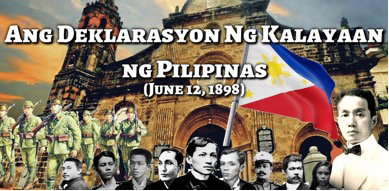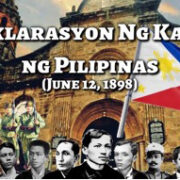
By Gus Mercado
June 12, 1898 marks a most important milestone in the history of the Philippines as the day the Republic was born. Every year since then, Filipinos all over the world take time to commemorate this significant event in their history — the culmination of nearly four centuries of struggle for nationhood.
The Philippines, written in poetry as “the cradle of noble heroes”, has a colorful and glorious history — of wars won and lost, of struggles for independence against colonizers, of bravery and sacrifice. Since the 16th century, the Philippines had been a part of the Spanish Empire until June 12, 1898 when its more than 300-years reign in the Philippines came to an end. After a bloody war, the first Philippine President Emilio Aguinaldo proclaimed the nation’s independence in Kawit, Cavite. This was followed by 50 years of American occupation when the Philippines became a U.S. colony, the only true colony that the U.S. has ever had. Then came the Japanese invasion where Filipino soldiers fought side-by-side with the Americans in defending the Philippine territory. Throughout the many centuries of foreign occupation, the flame of our national spirit and yearning for independence has never died.
Through trials and tribulation, we Filipinos have preserved democracy and freedom in our country. Despite the long history of foreign subjugation, we have given our country a national identity as a proud and independent member of the family of nations. Out of diversity, we have fostered a cohesive and unified nation-state.
We salute our many heroes, past and present, who have dedicated their lives to aspiring for the best and the noble, whatever cause or field of endeavor they had chosen to pursue.
Like our national hero, Dr. Jose P. Rizal, whose birthday we also mark this month, we applaud the numerous Filipinos who have made untold personal sacrifices for our country and for all of us who came after them.
From Lapulapu to Gabriela Silang, from Jose Rizal, Andres Bonifacio, Marcella Agoncillo and Apolinario Mabini to modern day heroes like Ninoy Aquino and our doctors and nurses in the frontlines during the pandemic, Filipino role models abound.
Rizal, the novelist, doctor, scientist, linguist, patriot and ultimately, martyr, has drawn the admiration of not just Filipinos, but people of other nations who recognize his genius and love of democracy as the marks of a true hero.
Rizal’s classic novels — Noli Me Tangere and El Filibusterismo – dramatized the pathetic lives of Filipinos under Spanish colonial rule and the abuses perpetrated against Filipinos by their colonizers. Finally, his execution at what is now the Rizal Park, sparked the Philippine Revolution of 1896 that eventually led to independence.
What has resulted from these sacrifices for freedom and independence is nothing short of a renaissance for the Filipino people, especially those who have chosen to pursue their careers overseas. From authors to sports figures, workers to actors, doctors and nurses, to teachers and engineers, to government leaders and lay ministers, we the living heirs now enjoy the fruits of freedom and democracy that our ancestors fought and died for. We cherish the examples set by our heroes, as beacons of inspiration and constant reminder that even in the face of formidable challenges and against all odds, yes, the Filipino can. The Filipino can overcome adversity. The Filipino can emerge triumphant, prosper and distinguish himself in his adopted land.
And those of us who have been blessed with a bountiful life abroad are paying back by keeping the Philippine economy afloat with our dollar remittances. Twelve million Filipinos living abroad send the equivalent of $31 billion to our families and relatives every year.
This heritage of nationhood, built painstakingly over time, is what makes us all Filipinos, regardless of where in the Philippines we come from, or where we are now, or what our occupation and status in life is. On this 124th year of our nationhood, therefore, we must rededicate ourselves to working for the good of our mother country and of all our people.
Two Most Important Chapters in Philippine History
Among many chapters of Philippine history that were written in blood, two special chapters stand out in reminding all of us of the countless Filipino lives lost in their fight for freedom. The first is the Philippine Revolution which culminated in the 1898 Declaration of Independence, on the altar of brave men and women who lost their lives in the conflict.
The other indelible chapter in our history that memorialized the bravery of the Filipino people is World War II where the Philippine nation lost a million lives including civilians and more than 200,000 Filipino and American soldiers fought side by side against the invaders, and gave their full measure of devotion to keep freedom alive. Thanks to the heroism of the Filipino soldiers who vowed that “never shall invaders trample thy sacred shores”, the cause of freedom in the Philippines ultimately prevailed.
Unbeknownst to the younger generations, it was the heroism and sacrifices of these heroes that gave us free passage as immigrants into this country.
The hard-fought Philippine Independence and what it stood for, both in the revolution against Spain and in the bloody aftermath of WWII, should remain ingrained in our consciousness and in our hearts. May the spirit of our heroes dwell within us and in our children, now and forever more. Mabuhay ang ating Kalayaan! Mabuhay tayong lahat!
* * *
The opinions, beliefs and viewpoints expressed by the author do not necessarily reflect the opinions, beliefs and viewpoints of the Asian Journal, its management, editorial board and staff.
* * *
Gus Mercado is a well-known civic and business leader from Dallas, Texas. He founded the Filipino Leaders Coalition of North Texas which organizes and sponsors the annual joint celebration of Philippine Independence Day in the region. He is a recipient of the Presidential BANAAG award for outstanding business leadership and exemplary stewardship of Filipinos in the U.S. He is married to Philippine Consul in Dallas, Hon. Ethel R. Mercado.






